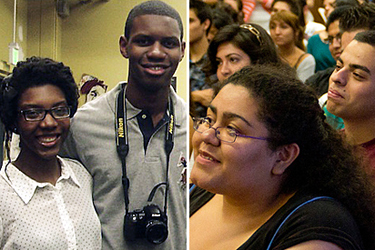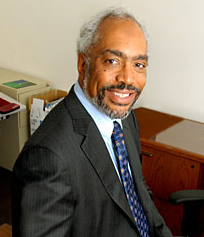Big boost for multicultural student development programs
Multicultural development programs for UC Berkeley students are getting a significant boost, starting with an infusion of funding and the hiring of three new, full-time program staffers now underway.

July 9, 2013

African American Student Development and Chicano/Latino Student Development are two of four programs undergoing a big upgrade.
Multicultural programs for UC Berkeley students are getting a significant boost, starting with the hiring of three new, full-time staffers now underway.
The three will expand and enhance the services of the Chicano/Latino Student Development, Asian Pacific American Student Development and African American Student Development programs, according to Gibor Basri, vice chancellor for equity and inclusion.
Funding also is being added to pay student interns for each of those programs, plus Native American Student Development, with the intent of strengthening leadership development opportunities.
“This is a major increase in what the programs can do,” said Basri, who led the Chancellor’s Taskforce on Multicultural Student Development that recommended the changes in May. Chancellor Robert Birgeneau approved them before he stepped down.
“We’re really looking forward to an upgrade in the quality and resources of these programs,” said Basri. “I’m glad we had this taskforce to sit down and think really hard about their needs.”
The upgrade includes plans to refurbish the space occupied by the Multicultural Student Development programs in the Cesar Chavez Student Center, to launch a new Chancellor’s Multicultural Advisory Board, to make changes in the governance structure over the MSD programs and to develop new engagement strategies for the campus community.

Gibor Basri, vice chancellor for equity and inclusion. (NewsCenter photo by Peg Skorpinski)
The MSD programs affected serve underrepresented students on campus and are organized by race/ethnicity and culture. Additional identity programs are organized around sexuality and gender, and they are grouped under the Multicultural, Sexuality and Gender Centers umbrella.
“The main purpose is to provide a place where students in these populations can find community and a safe space to talk about the challenges of being in that particular community, and get advice,” Basri explained. “They also provide a platform for that group to introduce itself to the rest of campus.”
The programs provide advising and peer community building, places where students can study with friends, referrals to resources all over campus, plus cultural events, seminars on how to do well at Berkeley, musical events, slams and dances.
The four programs targeted for the upgrade serve 1,000 to 1,500 students at any given time. They are open to anyone.
The new staffers will come on board in the fall to assist the directors of each program, Basri said. The infusion of cash for student interns will free up other funds for the programs’ use.
“These are underrepresented groups, meaning there are not as many students as there would be if we represented the state,” Basri noted. The students active in MSD also are involved in efforts to recruit and retain more students from underrepresented groups, and in helping “make sure students have a successful career here,” he added.
The MSD programs are “much more important” in the post-affirmative action era, he said; after California passed Proposition 209, the number of students in each group dropped by half.
The changes have their roots in a reorganization of the MSD programs that dates to July 2011. As a result of input from students, then-Chancellor Birgeneau announced last December that a task force would be formed to take a close look at the programs and make recommendations, if needed, to ensure that they meet their goal of enriching and supporting students.
The task force delivered its report to Birgeneau on May 6. The recommendations will be carried out through the fall.